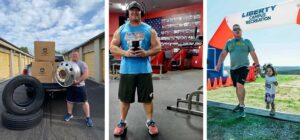Telematics, analytics, predictive monitoring — I’m sure these are all familiar terms to drivers today in the new technology-driven world of transportation.
The tech industry is constantly introducing new technology and all the solutions they are covering from production to delivery. So, you ask, what prompted me to write about telematics versus driver health? Well, I read an article in Work Truck magazine June 9 about the “Top 14 benefits of telematics beyond tracking.”
As I read the article, I was somewhat amused at how they made references to the use of telematics and how it helps manage the “health” of the truck and proper preventive maintenance. One line in the article stuck with me: “Engine data collected by a telematics device helps identify issues we can’t see with our eyes.” This states that this new technology can streamline maintenance, allowing drivers and companies to cut costs when dealing with repair on the road.
I could easily address each one of the 14 telematics benefits from the article and make a direct correlation to drivers’ health and well-being. Of course, I can’t address all 14 points in this column, but I will hit some of the highlights.
One important point is “vehicle health.” I realize we need to be conscious of the health of the truck, but it seems to me that the driver’s health is just as important. After all, you are manning the controls. Making sure healthy solutions are available to drivers and coaching would be a good start.
Another is the collection of “engine data.” What about providing an easy way for drivers to take a peek under their personal “hood” to see how their “engine” is performing? One solution is to set up on-site screenings for drivers while they are at the terminals, along with health education.
“Smart camera integrations” is noted in the article as offering the ability to prove a driver was practicing good defensive driving skills, and then rewarding that driver. What if the carriers rewarded drivers for receiving a long-term DOT medical card, saving the carrier on the cost of hiring and training a new driver? There is no doubt that technology has its advantages, but I believe we could use technology in driver health to keep our skilled drivers healthy and working.
As I mentioned, I could go on to point out correlations with the remaining 11 points, except for time and space limits.
Until next time, make sure both your truck and your personal health are in good working order.
Bob Perry is a regular contributor to The Trucker. He has spent nearly the past four decades on a mission to educate professional drivers and share life-changing products and services to help them live healthier lives while on the road. Recognized throughout the transportation industry, from bus drivers to over-the-road professional drivers, Perry has played an important role in creating a paradigm shift helping regulatory agencies, private and public sector entities, and consumers understand the current health challenges of the professional driver. He has participated as a wellness advocate in several roundtable discussions, large audience groups and small forums as well as going “curbside” through a national truck stop tour.
Bob’s articles have been featured in The Trucker and a number of other national transportation industry publications and is the host of a weekly wellness call produced by Rolling Strong. Bob has been a regular guest on RedEye Radio and Land-Line Radio, and is often an invited guest on Sirius radio shows. He has been featured in the New York Times, Men’s Health Magazine, Drug Store News, American Road Magazine, WSJ, NPR, ABC National Radio, as well as hundreds of daily newspapers. He has appeared on television news shows across the nation, including a featured TV segment on ABC NightLine News.











